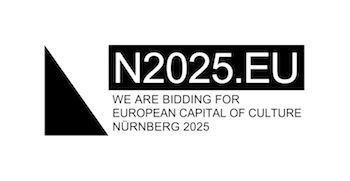Dear <<First Name>> <<Last Name>>,
you know that we are applying to be European Capital of Culture – in 2025. A long way to go? Yes and no. We keep saying that it’s a marathon rather than a sprint. Nevertheless: We need to act now — that’s indispensable for long-lasting success. We’re in a critical stage of the application process at the moment:
Recently, N2025 has announced their claim and new set of visuals in a press conference – together with a more concrete outlook on the financials. They are now intensely working on finalizing the bid book – they will hand it in end of September. It will thereafter also be open to the great public.
On the same day as the press conference, we have publicly presented the intermediate results of our work and our ten demands. N2025 has participated in the event, although they knew the demands some weeks before (to be able to cover them in the bid book). We really appreciate the mode of communication with them: it’s a permanent, critical yet constructive debate.
In late fall, there will be a presentation in Berlin, thereafter we will know which cities will be short listed. In other words: we will know whether we have reached round two. Irrespective of that, the process will have moved much: projects have been triggered, ideas have been implemented. Connections have been established, new discoveries have been made.
But what are the N2025 claim and visuals, what our #NUE2025 demands?
You will find out in some instants.
Have a good read and last summer days!
#NUE2025
#NUE2025 retrospect:
Handover of intermediate work results and demands
As you know, we have taken the time to look back on our work of the last three and a half years. We have gathered interim results and presented our demands. You can watch the presentation in the uncut video (German only). This newsletter gives a short summary. If you’d like to know more, please take a look at our comprehensive report (also German only), which is also linked at the end of the posts.
Nuremberg –
a civic city, of the people, by the people, for the people
Nuremberg is designed by the residents for all who live here. The city is not shaped by rulers, it has been built in a bottom-up fashion. Our culture is a culture by and for the citizens, an emancipated culture. Lately, however, we have all become saturated, and consequently turned sluggish. We see the application as a phase of revival of a lively culture. It is the chance to tackle future challenges and create something extraordinary. Our humanity expresses itself in the cultural activity, creates both breadth as well as peaks.
The cultural activity of us all is both expresses both breadth and peak of our humanity.
Looking back at 3 ½ years’ activities
NUE2025 was founded at the beginning of 2016 from within the Creative Monday community. In our first phase we have primarily been campaigning for the application; we also worked on some cross-cutting topics in further working groups.
With the Nuremberg City Council’s decision for the application in December 2016, we set off for a second phase. We built on the results of the first phase. At 21 meetings (as of August 2019), we integrated and networked cultural scenes and groups into the process. We have designed various open formats, such as a co-creation workshop in Joseph’s innovation laboratory on the topic of “visualizing the cultural landscape” and a “project casino” in which a wide variety of people use their know-how to help a project get off to a good start.
Concrete projects have also emerged from our environment, such as the Noris beGEISTert project, which was active in several workshops in primary schools. An essential component was also the networking and activation of the other centres of our metropolis (Fürth, Erlangen, Schwabach) as well as with active people beyond them. #NUE2025 representatives also took part as active participants in panel discussions, cultural workshops and conferences in Nuremberg and other German cities. We also provided a member of the jury for the 2019 Open Call.
In total, we estimate the number of active participants at 300 different people, at each meeting, up to 30 creatives were present.
Throughout our work, we met with representatives of political parties and factions as well as municipal administrations. We are constantly in critical-constructive exchange with the application office.
You can read the contents of the many public meetings in our materials (German only).
1. Metropolis SENF (Nuremberg, Fürth, Erlangen, Schwabach)
Our metropolis is growing and growing together. Fürth and Nuremberg have grown together in many places for a long time, the connections and commuter flows exist since long ago. We are convinced that the application process should be used to take up the common, urban culture and living space of the metropolis SENF (Nuremberg, Fürth, Erlangen, Schwabach), to initiate and align its further development. Administrative boundaries must not stand in the way, because many projects are only conceivable in the larger area with its approx. 800,000 inhabitants. The peculiarities of the individual towns naturally continue to exist in a multiple town with several centres, while together we also implement the larger development.
2. Education and university development
The metropolis is clearly underdeveloped as a university location in the field of cultural and creative disciplines. In addition to two strong general universities and the existing artistic universities, the offerings in the fields of performing arts, music and product and service design are still underrepresented, both in scope as well as in volume. There is a lack of advanced courses and research-driven courses in the field of „Commercial Arts“ – a pity, in particular, as the region’s economy is also very well positioned in that regard. There is even a lack of doctoral programs throughout all of Bavaria. There is an opportunity here to create internationally competitive institutions; there are plenty of suggestions from other applicant cities!
3. Genuine and comprehensive citizen participation
As you know, this has been one of our focal topics from the very beginning. In our work, we have identified two necessary core measures to implement this honestly:
3.1 Cultural Advisory Council of the citizens of our metropolis
Some countries and organizations have recently experienced citizens’ assemblies consisting of randomly selected delegates, who are thus much more representative of the society at large. Randomly selected does not mean elected, but drawn by lot. The procedure is intended to ensure that the society is represented as broadly as possible. As the future is at stake, all persons aged 16 or older should be included in the selection process and actively participate in shaping the application from the nomination on the shortlist to the evaluation after the Capital of Culture year.
3.2 Co-created Bid Book
An application written by professionals for professionals is not state of the art. The technology to involve massive numbers of co-authors is readily available. Since the formal requirements are high, we consider it useful to prepare an additional application document besides to the formal bid book that reflects the participation of the public in the application.
4. Culture of Enablement
We demand a change in the city administration’s approach. The central idea of the administration should become:
„How can I make this project possible?“
First distinct starting points that have been brought to our attention:
- More possibilities for public appearances
- Creating public stages
- Cultural ombudswomen and ombudsmen as contact persons and facilitators for the cultural sector
5. Spatial decentralization
In the city’s administrative departments, culture still thinks too much and too concretely (only) about the inner city and the slightly extended inner city belt. There are many possibilities outside this space that can be used. In order to increase this potential, a more decentralized approach should be adopted.
6. Inter-departmental competence for culture
The administration of the city of Nuremberg thinks too strongly in the departmental silos. Given predominant thought patterns, means and methods of the cultural department, future topics such as digitalization, new work and commercial arts cannot be grasped. Culture is overarching—just as much as the changes in the world brought about by digital change. In this respect, it must be integral part of the work in all departments: cultural work needs to be understood as a cross-functional responsibility with the department of culture as integrator.
7. Appearance and emancipation of the application campaign N2025
The application for the Capital of Culture can only fulfill its mandate as an urban development project if it emancipates itself from existing structures. This requires thinking outside of traditional hierarchies, to act decentrally, to encourage public discourse, openness for experimentation—up to a willingness to fail.
We are very pleased that on the day of our public handover of these demands, as a first step, the entire appearance of the N2025 application as well as a fresh framework concept were presented to the public. Our take on it: keep it up!
8. Further development of the cultural strategy in line with our demands
The cultural strategy was last publicly discussed in January 2018, i.e. about 1 ½ years ago. This is not sustainable for any instrument that should be a rolling development. The findings from the application process, which has been ongoing since then, should be incorporated into the cultural strategy, and the problems already discussed in the city council should be discussed and addressed.
We call for the cultural strategy to be published in a current reading version and to be discussed again in the city council in autumn, parallel to the submission of the application book.
9. Open the cultural offerings to everybody
We have formulated the desire to give everyone access to culture in two concrete projects:
9.1 KulturRucksack (cultural backpack)
The KulturRucksack, as developed by Theater Mummpitz and the City of Nuremberg, enables participating school classes to take part in four cultural programs together in one school year. In this way it enables cultural participation regardless of the background of the pupils. It should therefore be further expanded and permanently secured.
9.2 Universal cultural income
In order to enable different milieus to engage intensively with culture, there should be an unconditional cultural income in 2025. We imagine this as follows: In 2025, a cultural income will be paid to 0.1 ‰ of the population of the participating communities (i.e. according to the current population for the community of Nuremberg that would be 51 people). The participants are drawn from all applicants, the winners will receive a basic income of 1.200 € net/month and also free admission to all cultural event of the participating communities, in each case for the cultural capital year 2025. Furthermore the persons are supported with coaching, as conversion support for their project. The only condition is to make transparent what they want to contribute to cultural life this year and how they want others to participate in the work.
10. Broad concept of culture and its implementation in the application
Culture is everything that shapes our coexistence. This must be the basis of our cultural work. We were shocked to see that positions considered to have been overcome long since keep coming up again and again. A distinction between entertainment culture and serious culture should be avoided. Nuremberg has a strong foundation in the field of socio-culture. We should build on such bridges. Said traditional distinction we make between serious and entertaining culture cannot connect to international understanding and practice. We therefore urge all those involved in the process (both in the administration and other active parties) to abandon their thinking in terms of these categories, of funding and of monetary/fiscal categories. We need to foster a broad concept of culture and make it possible for the various dimensions to stimulate each other.
Nuremberg had answered the question of the breadth of culture over the last 40 years, let us all not fall behind, but now answer the question:
How do we create this breadth and, out of it, strong peaks?
The citizens of Nuremberg have repeatedly given this answer over the past centuries:
not out of a wish to represent,
but out of a drive to improve one’s own life.
Outlook and application process
On 12 December, the jury will announce the shortlist, i.e. the cities that will be entering the next round of application. We will continue to accompany the process and will decide together on the next steps as a result of the decision. Let’s jointly keep involved!
As already mentioned in the editorial, the application office will officially submit the application in the form of a so called “bid book” by the end of September. In late autumn, the cities will also present themselves personally in Berlin, before the Kulturstiftung der Länder (Cultural Foundation of the Federal States), as the lead organization, makes a decision.
If you would like to gain a little more insight into how the application process works and what criteria are applied, we recommend that you have an interview with Prof. Dr. Ulrich Fuchs.
You can find it as a video here (but the video consists only of sound; German only).
General background information can also be found on our website in the Knowledge section.
Open Call – 2019 winners of announced
Our bid office N2025 has announced this year’s Open Call winners. We congratulate all audience poll winners:
Also, strong congratulations to the winners of the jury decision:
We wish ample success, also to the many other exciting projects – good possibilities for implementation to you all!
Financial requirements for the Capital of Culture
Recently, the City of Nuremberg presented the concept for the Capital of Culture application at a press conference (to which we were also invited). The newspaper Nürnberger Nachrichten reported (in German), above all about the financial needs – the commentaries on the post online were mostly directed at: far too much money, for few elite culture consumers, the common citizen needs the financing for schools, roads, bridges.
Since the journalists do not present them, we show some complementary figures about the application for the Capital of Culture and compare them to other editions:
- Nuremberg’s application for the European Capital of Culture costs approx. 5 million
- The total city budget for the period: 6,000 million (6 billion)
- At the time of the ECOC application, Nuremberg is spending around 1,200 million (1.2 billion) on school buildings (buildings alone!)
- The renovation of the two bridges at the port will cost 170 million, the expansion of the Frankenschnellweg at the ramps is estimated at 650 million and rising.
- The city of Nuremberg’s budget for 2025 will be around 2,400 million (2.4 billion), which is 30 million, or approx. 1.2% of the annual budget.
- If the topic is new to you: ECOC means urban development by cultural means.
We think: Anyone who does not value the futurology of our city as a one-off invest of 1.2% of the budget (plus subsidies that would otherwise go to another city) probably look at the past only.
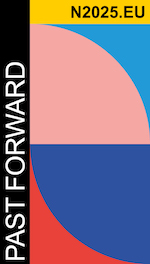 N2025
N2025
The application’s new face
We were already able to mark a check on one of our demands—as it has been implemented!
Yesterday at this time, the application office presented the claim and the visual identity for the application. N2025 has thus clearly emancipated itself from official city design.
All graphics are based on simple geometric basic forms and are supposed to develop further over the course of time by very different participants. A great approach that can develop its very own dynamic. By the way, the two triangles are a very strongly stylized „N“.
The claim „past forward“ alludes to a culture of memorizing as well as to „fast forward“, the function in which players quickly moved forward, so to speak into the future. It calls on us—to take up what already exists and to think further from today’s point of view.
Press
For quite some time, we’re well received by the press – up to now unfortunately in Germany and German only. You will find all publications on our Press site. The latest article published is “Mit SENF auf Europakurs” (translates to “On the journey to Europe with SENF”, with SENF referring to the metropolitan area Nuremberg-Fürth-Erlangen-Schwabach, but also being the word for mustard; the link will take you to nordbayern.de web presence). The article describes our activities, goals and ways to participation. The German broadcasting station MDR Sachsen-Anhalt recently also linked and described us as a citizen initiative as key driver of Nuremberg’s application in the feature “Kulturhauptstadt 2025: Gegen wen sich Magdeburg durchsetzen muss” (translating to “Capital of Culture 2025: Against whom Magdeburg needs to prevail”).
Next meetings
Our next in person meeting will be:
- Thursday 19 September 2019, 19:00
Stammtisch #NUE2025 (regular’s table)
Balazzo Brozzi, Hochstraße 2, Nuremberg
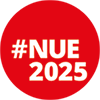


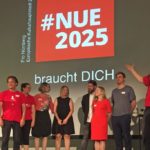
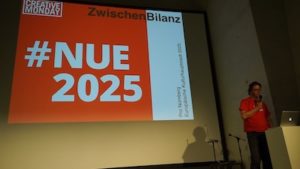
 N2025
N2025